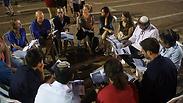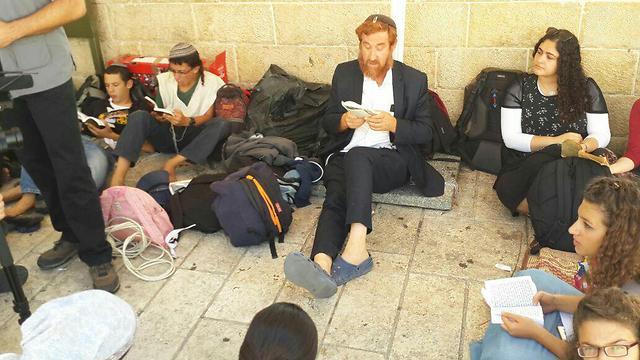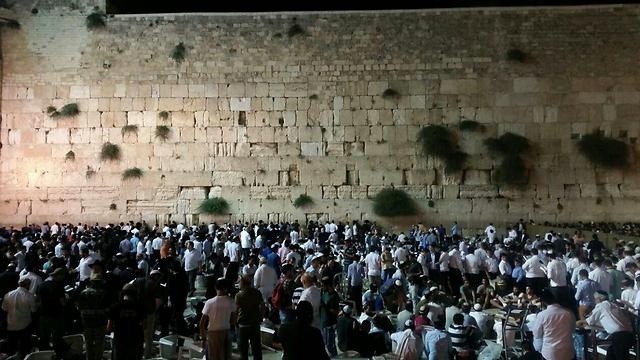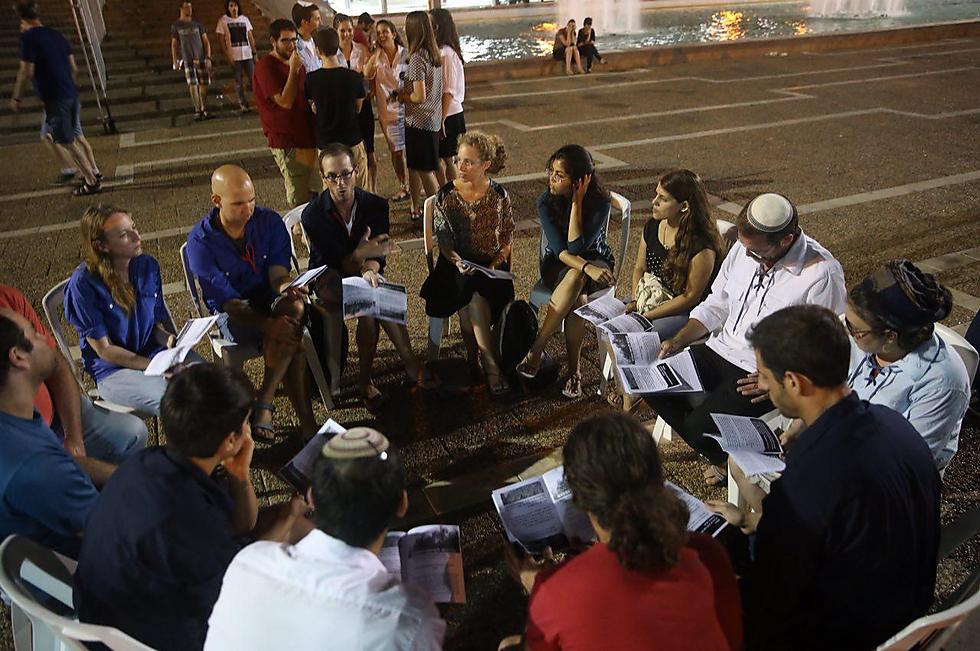
7 Jews removed from Temple Mount on Tisha B'Av after breaking rules
2000 years after the destruction of the Second Temple and the exiling of the people of Israel from their home, Jews commemorate Tisha B'Av with fasting, lamentations, and efforts to build bridges and end gratuitous hatred.
Seven Jewish visitors were detained and removed from the Temple Mount after breaking the rules for visiting the holy site on Sunday morning, while over 300 Jewish visitors were allowed into the complex during the fast of Tisha B'Av.
While police was removing the Jewish visitors from the site, Muslims started crowding around them and calling out insults. The police pushed back the crowd and accompanied the group to the exit from the complex. Several of the Muslim worshipers were also detained and removed from the site.
The Second Temple was destroyed and the people of Israel exiled from their home 2000 years ago. The Jewish people remember the death, destruction and devastation every year with a fast on Tisha B'Av (9th of the Jewish month of Av).

Starting Saturday night and continuing throughout the day Sunday, worshipers at the Kotel have been reading the Book of Lamentations, as well as lamentations written following the destruction of the Temple. Because studying Torah is considered a joyous activity, it is not permitted on Tisha B'Av.
Thousands of people arrived at the Western Wall in Jerusalem on Saturday night to mark Tisha B'Av by praying at the last remnant of the Second Temple, with thousands more expected to arrive throughout the day Sunday.
Eden said her prayers on that night were "for peace among the people of Israel, and for the end of all stupid disputes between us. Let us always know how to come together and be united, because this is what the Holy One Blessed be He wants. Fasting is not worth anything if it doesn't come from the heart."
"I wish for us to always be united and happy, and know how to accept the other," she added.
Hovav from Jerusalem comes to the Western Wall every year on Tisha B'Av. "It's a special feeling to see the entire people of Israel here every Tisha B'Av, coming to mourn the destruction of the Temple," he said. "We're glad for the fact we were blessed to be able to come here freely and pray for a new Temple to be built soon, in our time."
According to custom, worshipers sit on low chairs or on the floor—with some even sleeping on the floor—to signify the suffering of the mourning. At the synagogue, the Book of Lamentations is read in low lighting, and at times even by candle light.
Tisha B'Av is considered the most difficult of the several fasts which are dotted on the Jewish calendar because it begins the previous night and is set in the summertime. It is the second most important fast of the year—second only to Yom Kippur. In addition to the fasting, it is customary to avoid bathing, wearing leather shoes, or having relations.
Since Tisha B'Av coincides with Shabbat this year, the fast was postponed to Sunday, as mourning is strictly prohibited on Shabbat.
The mourning is not limited to the Western Wall. Millions of Jews in Israel and all over the world mark the day by fasting.
On Saturday night, special gatherings were held across the country, bringing together people from different sectors in an effort to end gratuitous hatred, which, according to Jewish belief is what led to the destruction of the Second Temple. The most notable of these events was one titled "Tonight, We Do Not Study Torah."
One such gathering has been taking place for three nights in a row at Rabin Square in Tel Aviv, where notable figures have attended such as poet Erez Biton, former education minister Yuli Tamir, the head of the Otniel hesder yeshiva Rabbi Re'em Ha'Cohen, Natan Meir—who is the husband of terror victim Dafna Meir—the heads of religious youth group Bnei Akiva and secular youth group the Working and Studying Youth, as well as teenagers and adults from different parts of society.
Kobi Nachshoni, Eli Mendelbaum and Roi Yanovsky contributed to this story.













